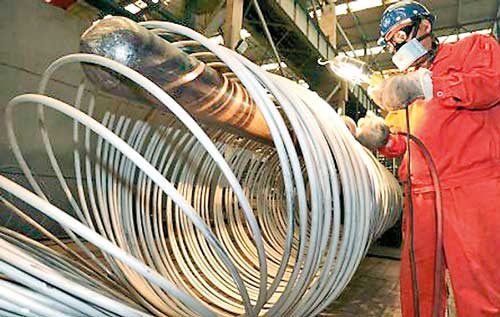Monday Feb 23, 2026
Monday Feb 23, 2026
Friday, 25 September 2015 00:00 - - {{hitsCtrl.values.hits}}
(Reuters) - The outlook for the global economy became bleaker on Wednesday as signs of a deeper manufacturing downturn in China emerged, coupled with slow growth in Europe and the United States.
“There is substantial concern at present that global demand weakness is dampening the economy in the industrial countries,” said Jorg Kramer, Chief Economist at Commerzbank.
China’s factory sector activity shrank at its fastest rate in more than six years in September, according to the monthly Caixin/Market survey, sending investors worried about sagging global growth scurrying out of risky assets.
The preliminary Caixin/Markit purchasing managers’ index (PMI) for China fell to 47.0, the worst since March 2009, missing expectations for 47.5 and slipping from August’s 47.3. Levels below 50 signify a contraction.
It was the seventh straight month of contraction for the Chinese manufacturing sector and the survey showed business conditions deteriorating almost across the board, as firms reduced output, prices and jobs at a faster pace as orders fell.
The data underline the malaise in the world’s second largest economy and just how difficult it will be for policymakers to steer the economy out of the biggest downturn in decades.
Last month, Beijing devalued the currency to support exports and boost growth, currently at 7% according to official data.
But that move was seen by investors as official endorsement of a slowing economy. A global financial market rout, notably in Chinese stocks, followed and forced the central bank to cut interest rates again, the fifth time since November.
China is a major importer of raw materials, especially from Australia, South Africa and Canada, and an exporter of finished goods. The slowdown in China is denting demand in emerging market countries which are dependent on commodity exports in particular.
Last week, the global market volatility of the past month figured high on a list of reasons the Federal Reserve did not raise US interest rates as many expected for the first time in almost a decade.
Overall in Asia, sentiment at the biggest companies tumbled at a record pace in the third quarter on worries about China and the risks it poses to global growth, a Thomson Reuters/INSEAD survey showed.
There are signs dwindling demand from Asia, led by China, is starting to hurt businesses in the euro zone, according to PMI survey compiler Markit.
Private business growth in the currency bloc slowed this month as Asian demand weakened, leading to fewer new jobs and forcing factories to reduce output.
The Markit Composite Flash PMI for the bloc came in at 53.9 in September against predictions of 54.1, down from 54.3 last month. Markit said the PMIs point to third-quarter growth of 0.4%.
“It is hard to see euro zone growth really kicking on,” said Howard Archer at IHS Global Insight.
“There is the very real risk that slowing growth in emerging markets like China not only hits euro zone exports but also has a negative impact on business sentiment and leads to a scaling back of investment and employment plans.”
Business activity in Germany, the euro zone’s biggest economy, slowed slightly in September while activity rebounded in France as manufacturing output swung back to growth after two consecutive months of decline.
Growth in the US manufacturing sector showed no month-over-month change during September, staying at August’s sluggish pace which was the weakest in almost two years, according to Markit.
The preliminary US Manufacturing PMI for September was 53, the same as August, which was its lowest since October 2013.
Economists polled by Reuters had forecast the September figure would be 53.0.
Job creation in the sector also slowed, with the index at 51.4, its weakest since July 2014, down from a final August reading of 52.4.